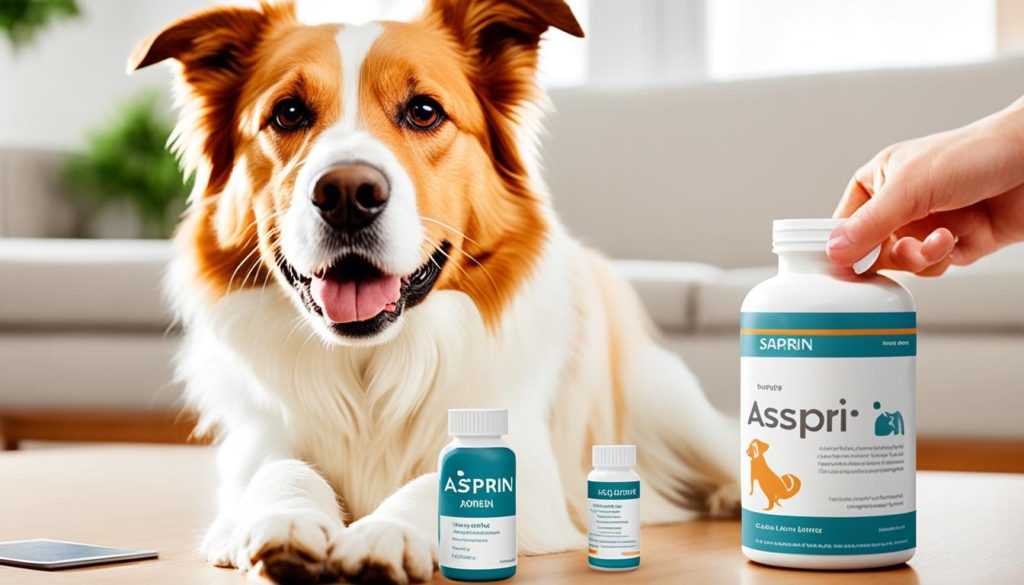Aspirin is a commonly used medication for pain relief in dogs. However, it is important to understand the correct dosage and potential risks associated with giving aspirin to dogs.
According to veterinary experts, the recommended dosage of aspirin for dogs is between 5mg and 10mg per pound of body weight, given twice a day. It is crucial to follow the instructions on the bottle of the brand you choose to use and consult with your veterinarian. Aspirin should not be used for long-term treatment and should be discontinued after a maximum of 5 days. It is also important to monitor your dog for any side effects, such as lethargy, loss of appetite, or gastrointestinal issues. Aspirin is not recommended for use in cats, as it can be toxic to them. Consulting with your veterinarian before administering any medication to your pet is always recommended to ensure their safety.
Key Takeaways:
- The recommended dosage of aspirin for dogs is between 5mg and 10mg per pound of body weight.
- Always follow the instructions on the bottle of aspirin and consult with your veterinarian.
- Monitor your dog for any side effects, such as lethargy, loss of appetite, or gastrointestinal issues.
- Aspirin is not recommended for use in cats as it can be toxic to them.
- Consult with your veterinarian before administering any medication to your pet to ensure their safety.
Is Aspirin Safe for Dogs?
Many pet owners wonder whether it is safe to give aspirin to their dogs. According to veterinary experts, aspirin can be relatively safe for dogs when used correctly. However, there are some risks and potential side effects to be aware of.
Aspirin should not be used for long-term treatment and should only be used for immediate pain relief and swelling. Potential side effects of aspirin in dogs include:
- Lethargy
- Loose stools
- Loss of appetite
- Stomach irritation
- Bleeding or ulcers
- The risk of organ damage if given in excessive amounts or too frequently
It is also important to note that aspirin should not be given to dogs with a blood clotting disorder or those that bleed easily. Additionally, aspirin is toxic to cats and should never be used on them.
When considering using aspirin for your dog, it is crucial to consult with your veterinarian before giving any medication. They can provide guidance on appropriate dosage, potential risks, and alternative pain relief options.
Remember, the safety and well-being of your pet should always be the top priority.
| Side Effects of Aspirin in Dogs | Risks of Aspirin Usage |
|---|---|
| Lethargy | Bleeding or ulcers |
| Loose stools | Potential organ damage |
| Loss of appetite | Stomach irritation |
Alternatives to Aspirin for Dogs
While aspirin can be effective in providing pain relief for dogs, there are alternatives that may be safer and have fewer potential side effects. Natural joint supplements for dogs, such as omega-3 fatty acids, glucosamine, and chondroitin sulfate, can help with joint pain and inflammation. CBD products specifically designed for dogs can also be effective in managing pain. Other alternative options include turmeric, Boswellia serrata, and acupuncture. It is important to consult with your veterinarian before using any alternative treatments or supplements to ensure they are appropriate and safe for your dog.
Comparison of Alternative Pain Relief Options
| Pain Relief Option | Benefits | Drawbacks |
|---|---|---|
| Natural Joint Supplements | – Help with joint pain and inflammation – Can be taken long-term – May have additional health benefits |
– Takes time to show results – May not be effective for all dogs |
| CBD Products | – Effective in managing pain – Non-psychoactive and safe for dogs – Can be used for various conditions |
– Quality and regulation can vary – More expensive than some other options |
| Turmeric | – Natural anti-inflammatory properties – Beneficial for various health conditions – Can be used as an addition to the diet |
– Requires consistent use for optimal results – May stain surfaces |
| Boswellia Serrata | – Natural anti-inflammatory properties – Can help with joint pain – Available in supplement form |
– May take time to show results – Not suitable for all dogs |
| Acupuncture | – Can provide pain relief – Non-invasive and drug-free – Can be used for various conditions |
– Requires trained professional – May not be suitable for all dogs – Multiple sessions may be needed |
When considering alternative treatments or supplements, it is essential to weigh the benefits and drawbacks and consult with your veterinarian. They can provide guidance on the most appropriate options for your dog’s specific needs and help ensure their safety and well-being.

The Importance of Proper Dosage and Monitoring
When giving aspirin to dogs, it is essential to follow the recommended dosage guidelines provided by your veterinarian. Dosage is based on the dog’s weight, and it is important to accurately measure and administer the correct amount. Giving too much aspirin can lead to toxicity and organ damage, while giving too little may not provide effective pain relief.
Consult your veterinarian to determine the appropriate canine aspirin dosage for your dog. They will consider your dog’s weight and specific health factors to determine the safest and most effective dosage. It is important to use a canine-specific aspirin product, as human aspirin can be harmful to dogs.
Regularly monitor your dog for any side effects or complications that may arise from taking aspirin. Common side effects include gastrointestinal upset, such as vomiting or diarrhea. If your dog experiences any adverse reactions, it is important to stop administering aspirin and consult with your veterinarian immediately.
Avoid giving aspirin to dogs with pre-existing health conditions, such as kidney or liver disease, as it may exacerbate their condition. It is also important to avoid giving aspirin to pregnant or nursing dogs.
“Proper dosage and monitoring are crucial to ensure the safety and well-being of your furry friend when providing aspirin for pain relief.”
Regular check-ups with your veterinarian can also help ensure that the aspirin dosage and treatment plan are still appropriate for your dog’s needs. Your veterinarian will be able to assess your dog’s response to the medication and make any necessary adjustments to the dosage or treatment plan.
Conclusion
When it comes to providing pain relief for your dog, aspirin can be a valuable option. However, it is crucial to use it safely to avoid potential risks. Ensuring you follow the recommended dosage guidelines is essential to prevent toxicity and organ damage. Monitor your dog closely for any side effects, such as lethargy or gastrointestinal issues.
Consulting with your veterinarian is always recommended before administering any medication to your pet. Your vet can provide guidance on the safe dose of aspirin for your dog based on their weight and specific health needs. They can also help identify any potential risks or contraindications.
It is worth considering alternative treatments and supplements for pain relief in dogs, which may offer safer options with fewer side effects. Natural joint supplements, such as omega-3 fatty acids or CBD products designed for dogs, can be effective alternatives. Always consult with your vet before incorporating any new treatments or supplements into your dog’s care regimen.
By staying informed, working closely with your veterinarian, and considering alternative options, you can ensure the well-being of your furry friend. Providing aspirin to dogs can be a safe and effective way to alleviate pain, as long as it is done responsibly and under veterinary supervision.
FAQ
How much aspirin can I give my dog?
The recommended dosage of aspirin for dogs is between 5mg and 10mg per pound of body weight, given twice a day. It is important to follow the instructions on the bottle of the brand you choose to use and consult with your veterinarian.
Is aspirin safe for dogs?
Aspirin can be relatively safe for dogs when used correctly. However, there are potential risks and side effects to be aware of. It should not be used for long-term treatment and should only be used for immediate pain relief and swelling. It is important to consult with your veterinarian before giving any medication to your pet to ensure their safety and well-being.
What are the alternatives to aspirin for dogs?
Natural joint supplements for dogs, such as omega-3 fatty acids, glucosamine, and chondroitin sulfate, can help with joint pain and inflammation. CBD products specifically designed for dogs can also be effective in managing pain. Other alternative options include turmeric, Boswellia serrata, and acupuncture. It is important to consult with your veterinarian before using any alternative treatments or supplements to ensure they are appropriate and safe for your dog.
How should I give aspirin to my dog?
When giving aspirin to dogs, it is essential to follow the recommended dosage guidelines provided by your veterinarian. Dosage is based on the dog’s weight, and it is important to accurately measure and administer the correct amount. It is also crucial to monitor your dog for any side effects or complications that may arise from taking aspirin. If any adverse reactions occur, it is important to consult with your veterinarian immediately.
